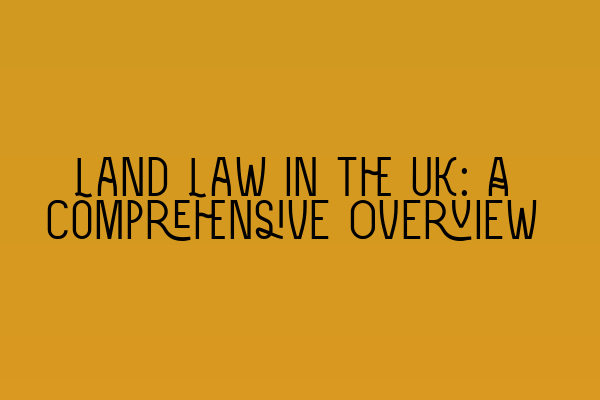Title: Land Law in the UK: A Comprehensive Overview
Introduction:
As we navigate through the dynamic world of property ownership, it is crucial to have a solid understanding of land law in the UK. Whether you are an aspiring homeowner, a property investor, or a legal professional specializing in real estate, this comprehensive overview is designed to provide you with the necessary knowledge to navigate the intricate landscape of land law in the UK.
1. The Basics of Land Law:
Land law in the UK encompasses the legal rules and regulations that govern the ownership, use, and transfer of land and property. These laws aim to ensure security, clarity, and fairness in property-based transactions, acting as a foundation for a well-functioning real estate market.
2. Freehold and Leasehold:
One of the fundamental aspects of land law revolves around the distinction between freehold and leasehold property. Freehold ownership grants full rights and ownership of both the land and any permanent structures built upon it. Conversely, leasehold ownership implies a temporary right to use a property, typically granted through a lease agreement with the freeholder.
3. Transfer of Property:
The transfer of property in the UK is governed by various legal mechanisms, such as conveyancing. Conveyancing involves the legal process of transferring ownership of land or property from one party to another, ensuring valid documentation, and registering the transfer with the Land Registry.
4. Easements and Covenants:
Easements and covenants are two essential legal concepts in land law that impact property ownership. Easements refer to the rights and restrictions attached to a particular property, such as the right to pass and repass over a neighboring property. Covenants, on the other hand, are legally binding obligations that affect the use and upkeep of a property, often detailed in property deeds or contracts.
5. Registered and Unregistered Land:
Understanding the difference between registered and unregistered land is crucial for any landowner or property professional. Registered land is recorded in the Land Registry, ensuring a clear title and record of ownership. Unregistered land, however, lacks such documentation, requiring a different process to establish ownership and rights.
6. Adverse Possession:
Adverse possession is a legal doctrine that allows someone who is not the legal owner to claim ownership of land or property. Various conditions must be met for adverse possession to apply, such as continuous possession for a specified period, often 12 years. It is important to seek legal advice if you believe you may have a claim or are defending against such a claim.
7. Planning and Development:
Town planning and development regulations are integral components of land law in the UK. Local authorities control and regulate land use through zoning, planning permissions, and development control mechanisms. Complying with these regulations is essential to avoid potential legal issues and to ensure harmonious development within communities.
Conclusion:
Land law in the UK is a complex and multifaceted area of law that governs property ownership, transference, and usage. By exploring the fundamental aspects covered in this comprehensive overview, you can navigate the intricacies of land law with confidence and ensure compliance with legal obligations and protections when engaging in property-related transactions.
For professional advice on land law matters, contact SQE Property Law & Land Law, where our team of experienced solicitors can guide you through the legal complexities of property ownership and transactions.
